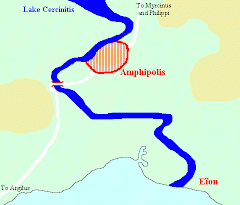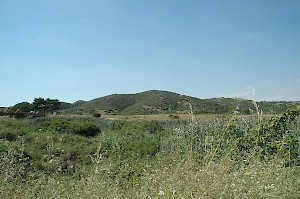Thucydides on the fall of Amphipolis
Fall of Amphipolis (424/423): one of the most important operations during the Archidamian War (431-421 BCE). It put an end to a series of Athenian successes and made the Athenians more willing to contemplate an armistice. The Spartan and Athenian commanders were Brasidas and Thucydides.

After the capture of 292 Spartans at Sphacteria, it looked as if nothing that the Athenians did could ever go wrong. Their defeat at Delium was a sign that they were not invincible, but could be regarded as an incident. This was different when in the winter of 424/423, the Spartan general Brasidas captured Amphipolis.
This important city had only recently been founded by the Athenians and was of the greatest strategic importance. Not only did it control a bridge across the Strymon in the road between Macedonia and the Chalkidike in the west to Thrace in the east, but the river itself was also important because there were forests upstream that produced the wood that was necessary to build ships. Finally, there were silver and gold mines. For more than sixty years, the Athenians would try to recover Amphipolis, until they had to accept that the Macedonian king Philip II had added it to his kingdom for good.

The Athenian commander whose task it was to defend Amphipolis was Thucydides, who was exiled as a punishment, and would write the History of the Peloponnesian War that is our most important source for this period. In the following fragment, he describes his own failure, without explaining why he was not present at Amphipolis, even though he knew that the Spartan commander Brasidas was in the neighborhood.
The translation of History of the Peloponnesian War 4.102.1-108.7 was made by Richard Crawley.
The fall of Amphipolis
[4.102.1] The same winter Brasidas, with his allies in the Thracian places, marched against Amphipolis, the Athenian colony on the river Strymon.
[4.102.2] A settlement upon the spot on which the city now stands was before attempted by Aristagoras, the Milesian (when he fled from king Darius),note who was however dislodged by the Edonians; and thirty-two years later by the Athenians, who sent thither ten thousand settlers of their own citizens, and whoever else chose to go. These were cut off at Drabescus by the Thracians.
[4.102.3] Twenty-nine years after, the Athenians returned (Hagnon, son of Nicias, being sent out as leader of the colony) and drove out the Edonians, and founded a town on the spot, formerly called Ennea Hodoi or Nine Ways.
[4.102.4] The base from which they started was Eïon, their commercial seaport at the mouth of the river, not more than three miles from the present town, which Hagnon named Amphipolis, because the Strymon flows round it on two sides, and he built it so as to be conspicuous from the sea and land alike, running a long wall across from river to river, to complete the circumference.
[4.103.1] Brasidas now marched against this town, starting from Arne in Chalkidike. Arriving about dusk at Aulon and Bromiscus, where the lake of Bolbe runs into the sea, he supped there, and went on during the night. The weather was stormy and it was snowing a little,
[4.103.2] which encouraged him to hurry on, in order, if possible, to take every one at Amphipolis by surprise, except the party who were to betray it.
[4.103.3] The plot was carried on by some natives of Argilus, an Andrian colony, residing in Amphipolis, where they had also other accomplices gained over by Perdiccasnote or the Chalkidians.
[4.103.4] But the most active in the matter were the inhabitants of Argilus itself, which is close by, who had always been suspected by the Athenians, and had had designs on the place.
These men now saw their opportunity arrive with Brasidas, and having for some time been in correspondence with their countrymen in Amphipolis for the betrayal of the town, at once received him into Argilus, and revolted from the Athenians, and that same night took him on to the bridge over the river;
[4.103.5] where he found only a small guard to oppose him, the town being at some distance from the passage, and the walls not reaching down to it as at present. This guard he easily drove in, partly through there being treason in their ranks, partly from the stormy state of the weather and the suddenness of his attack, and so got across the bridge, and immediately became master of all the property outside; the Amphipolitans having houses all over the quarter.
[4.104.1] The passage of Brasidas was a complete surprise to the people in the town; and the capture of many of those outside, and the flight of the rest within the wall, combined to produce great confusion among the citizens, especially as they did not trust one another.
[4.104.2] It is even said that if Brasidas, instead of stopping to pillage, had advanced straight against the town, he would probably have taken it.
[4.104.3] In fact, however, he established himself where he was and overran the country outside, and for the present remained inactive, vainly awaiting a demonstration on the part of his friends within.
[4.104.4] Meanwhile the party opposed to the traitors proved numerous enough to prevent the gates being immediately thrown open, and in concert with Eucles, the general, who had come from Athens to defend the place, sent to the other commander in Thrace, Thucydides, son of Olorus, the author of this history, who was at the isle of Thasos, a Parian colony, half a day's sail from Amphipolis, to tell him to come to their relief.
[4.104.5] On receipt of this message he at once set sail with seven ships which he had with him, in order, if possible, to reach Amphipolis in time to prevent its capitulation, or in any case to save Eïon.
[4.105.1] Meanwhile Brasidas, afraid of succors arriving by sea from Thasos, and learning that Thucydides possessed the right of working the gold mines in that part of Thrace, and had thus great influence with the inhabitants of the continent, hastened to gain the town, if possible, before the people of Amphipolis should be encouraged by his arrival to hope that he could save them by getting together a force of allies from the sea and from Thrace, and so refuse to surrender.
He accordingly offered moderate terms,
[4.105.2] proclaiming that any of the Amphipolitans and Athenians who chose, might continue to enjoy their property with full rights of citizenship; while those who did not wish to stay had five days to depart, taking their property with them.
[4.106.1] The bulk of the inhabitants, upon hearing this, began to change their minds, especially as only a small number of the citizens were Athenians, the majority having come from different quarters, and many of the prisoners outside had relations within the walls. They found the proclamation a fair one in comparison of what their fear had suggested; the Athenians being glad to go out, as they thought they ran more risk than the rest, and further, did not expect any speedy relief, and the multitude generally being content at being left in possession of their civic rights, and at such an unexpected reprieve from danger.
[4.106.2] The partisans of Brasidas now openly advocated this course, seeing that the feeling of the people had changed, and that they no longer gave ear to the Athenian general present; and thus the surrender was made and Brasidas was admitted by them on the terms of his proclamation.
[4.106.3] In this way they gave up the city, and late in the same day Thucydides and his ships entered the harbor of Eïon, Brasidas having just got hold of Amphipolis, and having been within a night of taking Eïon: had the ships been less prompt in relieving it, in the morning it would have been his.
[4.107.1] After this Thucydides put all in order at Eïon to secure it against any present or future attack of Brasidas, and received such as had elected to come there from the interior according to the terms agreed on.
[4.107.2] Meanwhile Brasidas suddenly sailed with a number of boats down the river to Eïon to see if he could not seize the point running out from the wall, and so command the entrance; at the same time he attempted it by land, but was beaten off on both sides and had to content himself with arranging matters at Amphipolis and in the neighborhood.
[4.107.3] Myrcinus, an Edonian town, also came over to him; the Edonian king Pittacus having been killed by the sons of Goaxis and his own wife Brauro; and Galepsus and Oesime, which are Thasian colonies, not long after followed its example. Perdiccas too came up immediately after the capture and joined in these arrangements.
[4.108.1] The news that Amphipolis was in the hands of the enemy caused great alarm at Athens. Not only was the town valuable for the timber it afforded for shipbuilding, and the money that it brought in, but also, although the escort of the Thessalians gave the Spartans a means of reaching the allies of Athens as far as the Strymon, yet as long as they were not masters of the bridge but were watched on the side of Eïon by the Athenian galleys, and on the land side impeded by a large and extensive lake formed by the waters of the river, it was impossible for them to go any further. Now, on the contrary, the path seemed open.
[4.108.2] There was also the fear of the allies revolting, owing to the moderation displayed by Brasidas in all his conduct, and to the declarations which he was everywhere making that he sent out to free Greece.
[4.108.3] The towns subject to the Athenians, hearing of the capture of Amphipolis and of the terms accorded to it, and of the gentleness of Brasidas, felt most strongly encouraged to change their condition, and sent secret messages to him, begging him to come on to them; each wishing to be the first to revolt. Indeed there seemed to be no danger in so doing; their mistake in their estimate of the Athenian power was as great as that power afterwards turned out to be,
[4.108.4] and their judgment was based more upon blind wishing than upon any sound prevision; for it is a habit of mankind to entrust to careless hope what they long for, and to use sovereign reason to thrust aside what they do not fancy.
[4.108.5] Besides the late severe blow which the Athenians had met with in Boeotia,note joined to the seductive, though untrue, statements of Brasidas, about the Athenians not having ventured to engage his single army at Nisaea,note made the allies confident, and caused them to believe that no Athenian force would be sent against them.
[4.108.6] Above all the wish to do what was agreeable at the moment, and the likelihood that they should find the Spartans full of zeal at starting, made them eager to venture. Observing this, the Athenians sent garrisons to the different towns, as far as was possible at such short notice and in winter; while Brasidas sent dispatches to Sparta asking for reinforcements, and himself made preparations for building galleys in the Strymon.
[4.108.7] The Spartans however did not send him any, partly through envy on the part of their chief men, partly because they were more bent on recovering the prisoners of the island and ending the war.